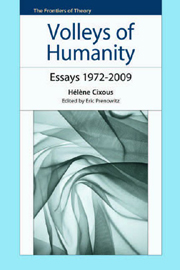Book contents
- Frontmatter
- Contents
- Sources
- Series Editor's Preface
- Introduction: Cixousian Gambols
- 1 Fiction and Its Phantoms: A Reading of Freud's Das Unheimliche (The ‘Uncanny’)
- 2 The Character of ‘Character’
- 3 Missexuality: Where Come I Play?
- 4 The Pleasure Reinciple or Paradox Lost
- 5 Reaching the Point of Wheat, or A Portrait of the Artist as a Maturing Woman
- 6 Letter to Zohra Drif
- 7 The Names of Oran
- 8 The Book as One of Its Own Characters
- 9 How Not to Speak of Algeria
- 10 The Oklahoma Nature Theater Is Recruiting
- 11 The Book I Don't Write
- 12 The Unforeseeable
- 13 Passion Michel Foucault
- 14 Promised Cities
- 15 Volleys of Humanity
- Acknowledgements
- Index
8 - The Book as One of Its Own Characters
Published online by Cambridge University Press: 12 September 2012
- Frontmatter
- Contents
- Sources
- Series Editor's Preface
- Introduction: Cixousian Gambols
- 1 Fiction and Its Phantoms: A Reading of Freud's Das Unheimliche (The ‘Uncanny’)
- 2 The Character of ‘Character’
- 3 Missexuality: Where Come I Play?
- 4 The Pleasure Reinciple or Paradox Lost
- 5 Reaching the Point of Wheat, or A Portrait of the Artist as a Maturing Woman
- 6 Letter to Zohra Drif
- 7 The Names of Oran
- 8 The Book as One of Its Own Characters
- 9 How Not to Speak of Algeria
- 10 The Oklahoma Nature Theater Is Recruiting
- 11 The Book I Don't Write
- 12 The Unforeseeable
- 13 Passion Michel Foucault
- 14 Promised Cities
- 15 Volleys of Humanity
- Acknowledgements
- Index
Summary
Books are characters in books. Between authors and books, not everything can be taken for granted. At the point where the author (‘I’) thinks s/he can close the door on a chapter, the book puts its foot in the door. If I want to explain myself, the book cuts me off and takes the floor in my stead.
The story I have to tell is the story of writing's violence. I want to write what I cannot write. The book helps me. The book leads me astray, carries me away. It wants to write. It wants me to write it; I want to write the book I am pursuing with my dreams. Will I ever get it written?
A book is not only writing: it is a weapon; it is a misdeed; it is a race for the secret(s). It is a struggle against memory, for memories. One is in pieces; one patches oneself back together. That is why I love The Life of Henry Brulard – a life that is a book in the process of skinning itself, churning its own blood, getting cold feet, arguing energetically about death and destiny in the kitchen. There is food and drink and enough laughter to bring tears, in books where the book makes a commotion. And there is ‘no alibi’, as my friend Derrida would say.
Die Ursache – The Thing
At the beginning of my autobibliography, I didn't write books, I didn't write, things happened, at night. Others would have said ‘books’ perhaps. But I called them things, these residues of nocturnal earthquakes and convulsions. Living speaking frightening things. Untitled lava flow, spread by cracks in the soul.
- Type
- Chapter
- Information
- Volleys of HumanityEssays 1972–2009, pp. 125 - 159Publisher: Edinburgh University PressPrint publication year: 2011



